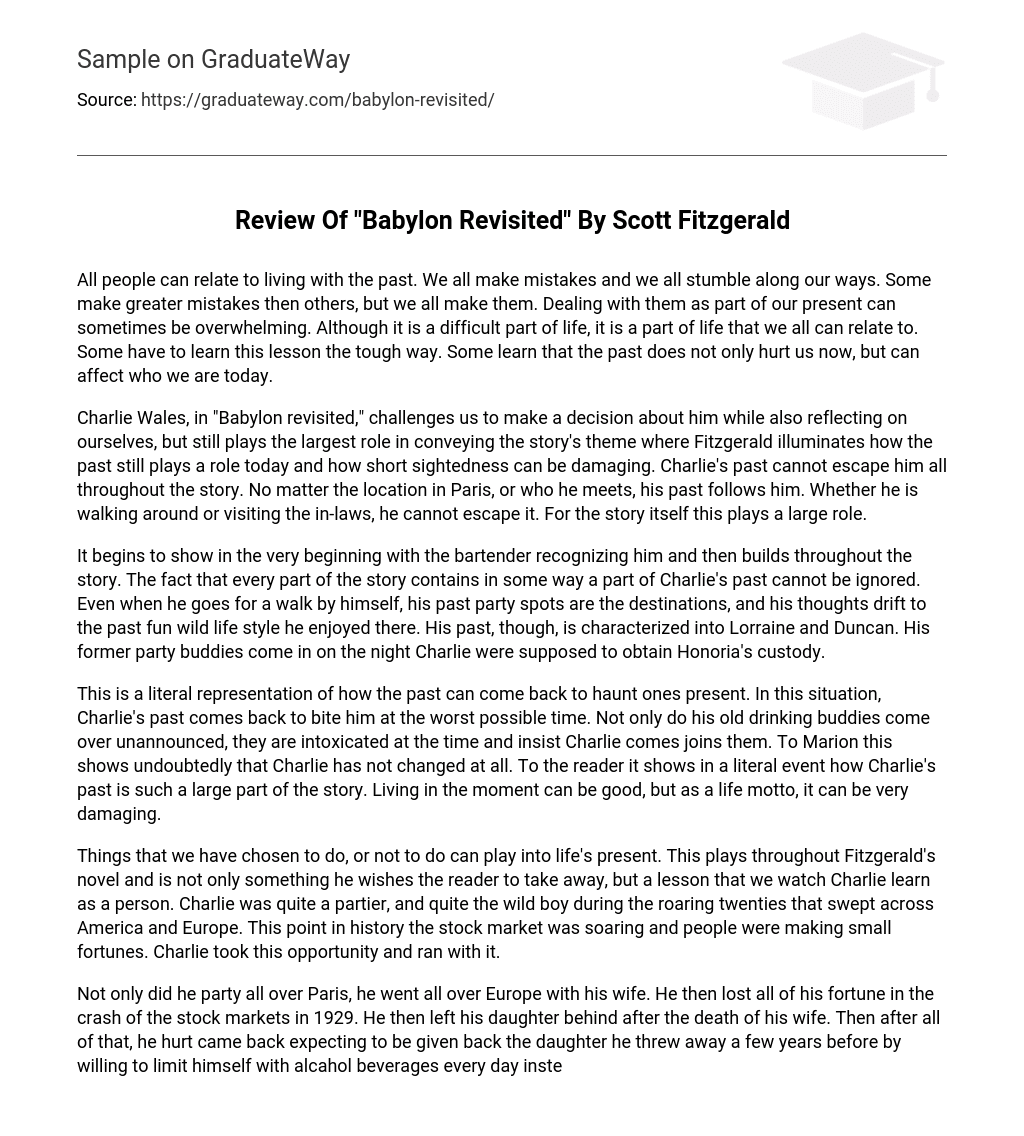Living with the past is a universal experience shared by all individuals. Mistakes are an inherent part of our lives, and all of us encounter obstacles along our paths. While the magnitude of our mistakes may vary, they are an inevitable aspect of being human. Coping with these mistakes in the present can often be overwhelming. However, despite the difficulties, it is a common experience that connects us all. Some individuals must learn this lesson through difficult experiences, understanding that our past not only affects us in the present but also shapes our identity.
In “Babylon revisited,” Charlie Wales challenges our perception of him and prompts us to reflect upon ourselves. However, he also serves as the main character in conveying the story’s theme, in which Fitzgerald demonstrates the lasting impact of the past and the consequences of shortsightedness. Throughout the story, Charlie is haunted by his past, regardless of his location in Paris or the people he encounters. Regardless of whether he is strolling around or visiting his in-laws, his past remains ever-present. Overall, this significant aspect greatly influences the overall narrative.
The story starts with the bartender recognizing Charlie at the very beginning and this theme is carried throughout. Each part of the story somehow involves a part of Charlie’s past, even when he takes a solo walk, he goes to his old party spots and reminisces about his previous wild lifestyle. However, his past is represented by Lorraine and Duncan. These old party companions appear on the night that Charlie was supposed to get custody of Honoria.
This passage illustrates how the past can resurface to trouble someone in the present. Charlie, in particular, experiences the consequences of his past actions at an inopportune moment. His former drinking companions unexpectedly arrive, heavily under the influence, and pressure Charlie to join them. Marion views this as indisputable evidence that Charlie has not reformed. For the reader, this occurrence serves as a tangible example of how Charlie’s past significantly influences the narrative. While living in the present has its merits, adopting it as a life philosophy can result in severe harm.
The decisions we make, whether they be actions or inactions, can have an impact on our present life. F. Fitzgerald’s novel portrays this idea and emphasizes its significance not only for readers to understand but also for Charlie to learn as a character. In the 1920s, commonly known as the roaring twenties, Charlie was a lively and adventurous individual, deeply immersed in the party culture that thrived in America and Europe. Amidst the booming stock market and widespread wealth accumulation, Charlie seized the chance and embraced it wholeheartedly.
Despite his enjoyment of partying in Paris and traveling across Europe with his wife, the man’s wealth was ultimately lost due to the stock market crash in 1929. Following his wife’s death, he left his daughter behind. However, upon returning, he made a commitment to regain custody of the daughter he had previously abandoned by vowing to control his daily alcohol consumption instead of remaining a heavy drinker. These difficult experiences taught Charlie an important lesson about how past actions impact the present.
Charlie’s realization that his past is inescapable sheds light on his inherent shortsightedness. He only focuses on his current desires and circumstances, failing to recognize the lasting impact of his actions. It is only during his final visit with his daughter that he comprehends the profound influence the past can have on one’s present situation. His shortsightedness blinds him to the pain he inflicted upon his in-laws when he abruptly walked out.
He finally begins to change towards the end of the story, even before returning to Paris and gaining a broader perspective of the world. Fitzgerald employs characters Lorraine and Duncan to impart this crucial lesson to Charlie. By employing Charlie as a character, Fitzgerald demonstrates the lasting impact of the past on individuals and highlights the consequences of being shortsighted. Additionally, other characters such as Lorraine, Duncan, Marion, and Lincoln further reinforce these lessons through their actions throughout the story.
While the direct statement of the theme is absent, it enables every reader to interpret a slightly different message. Despite the message not significantly changing, Fitzgerald permits each reader to grasp a distinct rendition of the same underlying message. By depicting Charlie’s gradual transformation, he achieves this goal most successfully. Though we may disapprove of Charlie’s history, can we truly use it as the sole basis for judging him? Put yourself in his shoes – would you want to be solely judged based on your past?





